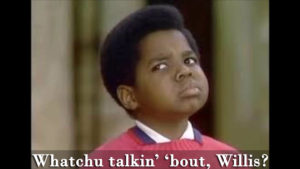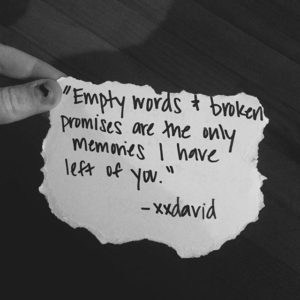 “What?”
“What?”
“I said, ‘Do you miss her?'” came my friend’s reply. We were out having lunch and, I supppose, being single for these last two’ish years, he wondered if I missed Julia, my narcissist of 4-½ years. It was a question I wasn’t expecting. And, to be honest, I didn’t know how to answer. Do I miss her? Well, if I’m being honest with myself, the short answer is, “Yes.” But the long answer? Well, it’s long.
It was one week ago today when my friend asked me that question. Admittedly, it gave me cause to pause and ponder. As stated above, yes, I do miss Julia but not in the way he meant and, most probably, not in the way most people might imagine. Now, for that somewhat enigmatic answer to  coalesce into some semblance of sense, you have to understand my previous dating dynamics and the dynamic that came to exist betwixt Julia and me. For many years prior, in fact, up until the day I met Julia, I had been starved on so many different levels for a truly spiritual, intellectual, physical, and soulful connection with the people whom I had become romantically involved. Of course, as is most usually the case, one doesn’t genuinely know just how hungry they are for what they’ve been denied until that moment when they first savor its flavor. But having finally partaken, once that something which has become so deeply ingrained in your life is suddenly removed, there is an undeniable void where that succulent satiation had once resided.
coalesce into some semblance of sense, you have to understand my previous dating dynamics and the dynamic that came to exist betwixt Julia and me. For many years prior, in fact, up until the day I met Julia, I had been starved on so many different levels for a truly spiritual, intellectual, physical, and soulful connection with the people whom I had become romantically involved. Of course, as is most usually the case, one doesn’t genuinely know just how hungry they are for what they’ve been denied until that moment when they first savor its flavor. But having finally partaken, once that something which has become so deeply ingrained in your life is suddenly removed, there is an undeniable void where that succulent satiation had once resided.
Regular readers may recall that Julia is from Uzbekistan and, as such, she spoke Russian. I’ve long loved the Russian language and, truth be told, I think it’s probably the most beautiful language I’ve ever heard. Although, that’s not to say that, as with any language, the Russian culture doesn’t have its fair  share of linguistic butchers. Julia’s Russian is absolutely flawless, as is her English. In contrast, I’ve had more than one occasion to meet native Russian speakers who spoke a very lazy and slurred Russian (native Russian-speakers know exactly what I’m talking about) and, as such, their English exuded that same acoustically lackadaisical quality, as well. As one might imagine, those inarticulate annunciations can quickly become a relentlessly grating aural assault to a grammar nazi such as myself. But this wasn’t the case with Julia. I remember, many times, sitting and listening in silent adulation as she spoke to her mother, sister-in-law, or a friend on the phone, her mellifluous Russian rolling effortlessly off her tongue.
share of linguistic butchers. Julia’s Russian is absolutely flawless, as is her English. In contrast, I’ve had more than one occasion to meet native Russian speakers who spoke a very lazy and slurred Russian (native Russian-speakers know exactly what I’m talking about) and, as such, their English exuded that same acoustically lackadaisical quality, as well. As one might imagine, those inarticulate annunciations can quickly become a relentlessly grating aural assault to a grammar nazi such as myself. But this wasn’t the case with Julia. I remember, many times, sitting and listening in silent adulation as she spoke to her mother, sister-in-law, or a friend on the phone, her mellifluous Russian rolling effortlessly off her tongue.
Then, there was the intellectual connection. Without exaggeration, Julia and I could and would talk for hours about anything and most everything whether it was the nursing program she was suffering through to get her bachelor’s degree, the dysfunctional dynamic that existed betwixt her mother, father, brother Justin and herself, to health and fitness, politics, faith, cooking; you name it. That intellectual connection was truly a welcome reprieve  from what I had previously come to accept as the norm. But here’s the thing: I don’t miss Julia, the person, per se. I miss what I thought she and I shared, the lie that was us, but I absolutely do not miss what we actually shared. If I had to sum it up, what I miss are the tiny oases of perceived truth – those fabricated deep and soulful connections – not the endless and arid desert of lies that had become our relationship (if you can call it that). And therein is where we often fall into the trap of missing our narcissist and, subsequently, returning to them over and over again, ad infinitum: we confuse missing the very few good things and times we share(d) with our narcissist, with missing them – though the two are very different paradigms – and this is why we can never (read should never) return once we see them for who and what they truly are.
from what I had previously come to accept as the norm. But here’s the thing: I don’t miss Julia, the person, per se. I miss what I thought she and I shared, the lie that was us, but I absolutely do not miss what we actually shared. If I had to sum it up, what I miss are the tiny oases of perceived truth – those fabricated deep and soulful connections – not the endless and arid desert of lies that had become our relationship (if you can call it that). And therein is where we often fall into the trap of missing our narcissist and, subsequently, returning to them over and over again, ad infinitum: we confuse missing the very few good things and times we share(d) with our narcissist, with missing them – though the two are very different paradigms – and this is why we can never (read should never) return once we see them for who and what they truly are.
This leads us to one of the hardest truths to accept when loving a narcissist, or any toxic person for that matter, when it comes time to excise them from your life and, invariably, that time will come, just as one would attempt to remove a cancerous tumor, such an undertaking is going to be one of the hardest, if not the hardest, experiences you’ve ever endured. And do you know why? Because you simply cannot remove a cancerous growth without removing surrounding healthy tissue, too. Would you care to guess what that  healthy “tissue” is that has to be excised along with your narcissist? You. Yes, you. Or, more precisely, certain, small parts of you that have become intertwined with your narcissist’s prescence in your life. This is where we have to be the strongest, especially when our narcissist begins their hoovering efforts to suck us back into their toxic and manipulative microcosm. Unfortunately, due to the seemingly perpetual lingering effects of the tramua bonding we were subjected to by our narcissist, our defenses have become so weakened, we begin to bargain with ourselves and rationalize that the copious amounts of hell with and without our narcissist are somehow worth the very few and fleeting fragments of paradise with them. If anything, we cannot succumb. We must stay strong, especially now.
healthy “tissue” is that has to be excised along with your narcissist? You. Yes, you. Or, more precisely, certain, small parts of you that have become intertwined with your narcissist’s prescence in your life. This is where we have to be the strongest, especially when our narcissist begins their hoovering efforts to suck us back into their toxic and manipulative microcosm. Unfortunately, due to the seemingly perpetual lingering effects of the tramua bonding we were subjected to by our narcissist, our defenses have become so weakened, we begin to bargain with ourselves and rationalize that the copious amounts of hell with and without our narcissist are somehow worth the very few and fleeting fragments of paradise with them. If anything, we cannot succumb. We must stay strong, especially now.
But no matter how strong, empowered, and emboldened we may feel, no matter how frequently and firmly we reassure ourselves we don’t need them when we’re  lying in bed in the dark of night, begrudgingly missing them, wishing they were here with us or we were there with them – wondering why this simple longing to spend time together cannot be a reality – leaving them is probably the hardest thing we will ever have to do because, as with cancer’s entangling tendrils, our narcissist has become so deeply entrenched in our lives, our hearts and, yes, even our souls. Therefore, to remove our narcissist from our lives is to also remove parts of us that we rightly fear we may never be able to reclaim. So, does that mean we shouldn’t purge ourselves of this disease?
lying in bed in the dark of night, begrudgingly missing them, wishing they were here with us or we were there with them – wondering why this simple longing to spend time together cannot be a reality – leaving them is probably the hardest thing we will ever have to do because, as with cancer’s entangling tendrils, our narcissist has become so deeply entrenched in our lives, our hearts and, yes, even our souls. Therefore, to remove our narcissist from our lives is to also remove parts of us that we rightly fear we may never be able to reclaim. So, does that mean we shouldn’t purge ourselves of this disease?
No. No matter what, we must never forget that our narcissist is a lecherous presence that will literally continue to feed off of us until there is nothing left to consume, no “food” remaining to satiate and placate their truly insatiable abyssal hunger. At that point, we, who were once our narcissist’s supply, will be cast aside as the empty husk we’ve become to them, only to watch helplessly as they’re off to their next source, their next conquest, their next emotional banquet on  which to gorge. Therefore, we have two options: we can choose to see no more sunrises or we can purge the disease before it overtakes and consumes us completely. The latter, of course, entails having to also let some small parts of us go, too. But here’s the beautiful truth – as with many successful life-saving surgeries, once you’ve sufficiently healed, you can, and almost always do, return to a fruitful life, happier and healthier than you could have or would have ever been if you had allowed the disease to continue unchecked and on its terminal course. And that former option? Well, you see, beautiful, we call ourselves “survivors” because not all of us make it out alive. How’s that for a gut-punch truth? You’re here. You’re reading this. Not everyone who’s been where you were, who is where you are now, can say that. I promise you this; you’re stronger than you think, and it will get better.
which to gorge. Therefore, we have two options: we can choose to see no more sunrises or we can purge the disease before it overtakes and consumes us completely. The latter, of course, entails having to also let some small parts of us go, too. But here’s the beautiful truth – as with many successful life-saving surgeries, once you’ve sufficiently healed, you can, and almost always do, return to a fruitful life, happier and healthier than you could have or would have ever been if you had allowed the disease to continue unchecked and on its terminal course. And that former option? Well, you see, beautiful, we call ourselves “survivors” because not all of us make it out alive. How’s that for a gut-punch truth? You’re here. You’re reading this. Not everyone who’s been where you were, who is where you are now, can say that. I promise you this; you’re stronger than you think, and it will get better.
So, do I miss my narcissist? No. I don’t miss her. Nor do I hate her. In fact, I really don’t feel anything toward or for her. And I certainly don’t miss the downward-spiraling, self-destructive draining waste of spirit and energy trying to figure out how much of what she’s telling me is the truth, and how much is a manufactured truth she wants me to believe. I don’t miss the  trauma bonding, the gaslighting, the triangulation, the ubiquitous anxiety (read realization) that I’m not the only person sharing her affections and her bed, nor do I miss her self-absorbed focus on the upheaval in her life that was solely the product of her doing. What I do miss is that feeling of a deep intellectual, soulful, and emotional connection with someone, even if it was unilateral. I do miss hearing Russian flowing so fluidly and articulately. I even miss the delusional façade that someone whom I deeply respected, revered, and held in such high regard and in whom I felt such an unabiding admiration, also viewed me as their equal. But, no. I don’t miss her. What about you? Do you miss your narcissist?
trauma bonding, the gaslighting, the triangulation, the ubiquitous anxiety (read realization) that I’m not the only person sharing her affections and her bed, nor do I miss her self-absorbed focus on the upheaval in her life that was solely the product of her doing. What I do miss is that feeling of a deep intellectual, soulful, and emotional connection with someone, even if it was unilateral. I do miss hearing Russian flowing so fluidly and articulately. I even miss the delusional façade that someone whom I deeply respected, revered, and held in such high regard and in whom I felt such an unabiding admiration, also viewed me as their equal. But, no. I don’t miss her. What about you? Do you miss your narcissist?


Feel free to comment below! ?